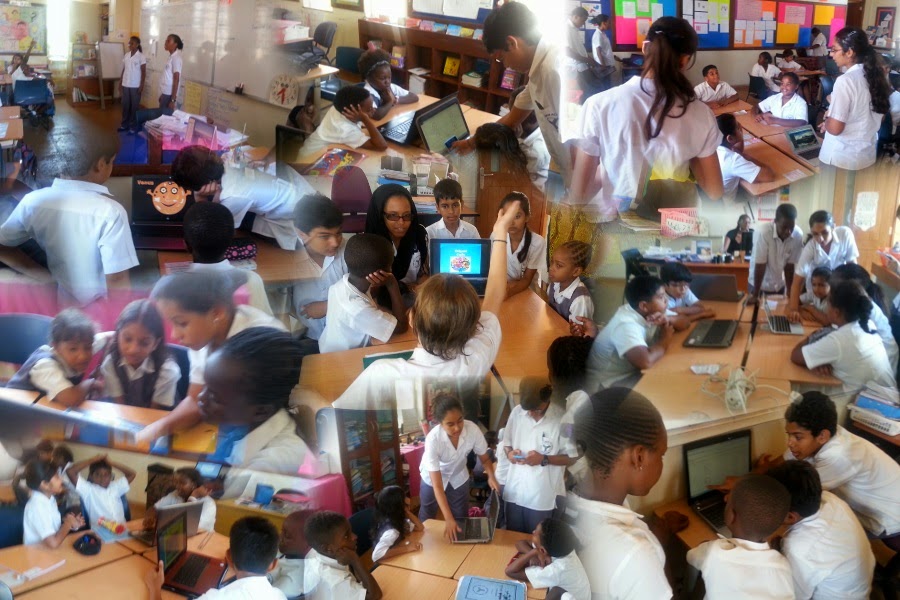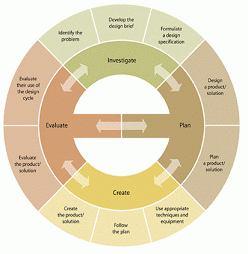. Tasks developed should be open-ended, allowing the students to choose their own personal response, as well as address a real need in the community.
· The investigate stageshould include a student-developed design brief along with a very specific list of design specifications for the product, as well as a method of testing each of these and include research in the students’ own words into the materials/software/hardware needed to create the product.
· The design phase should include visual evidence in the form of sketches, models or prototypes of the development of more than one design for the same end product and all designs should be evaluated against the design specification to select the final choice for creation.
· The plan stage should include all of the steps needed for the creation of the product along with an estimated time for completion and resources needed along with an evaluation that justifies any modifications to the design.
· Students must submit documentation of the process of creation in order to receive a level for this criterion. This documentation should be dated and make references to all the steps taken during the creation phase as well as any modifications made to the plan. The development of the product should take place over a prolonged period of time in order to allow the students to develop high quality end products.
· The evaluate stage should deal primarily with the following three issues: an evaluation of the product based on objective testing with the end user and include suggestions for further improvement; an evaluation of the process at each stage of the design cycle with suggestions for improvement; and an evaluation of the realistic impact of the product on the students life, society and/or environment.
The process Jounrnal The Process Journal is designed to track our progress and reflections throughout your work in the Design Cycle. You may use your IT Notebook for this. |
On the front cover, write your name and homeroom, then in big, neat letters write: PROCESS JOURNAL.
Every time you work on your Technology
project, you are tasked to write a one-page (minimum) reflection. Make sure your entry has all the following
information when applicable:
What
you did
This
is the basic thing you include in your
Process
Journal: you write what you did.
|
Why?
Explain
why you do things like you do. Try
to
explain in terms of the stage of the Design
Cycle.
|
Pictures
and Diagrams
Your IT Notebook
is a grid notebook for a reason! If
you have made something and
are writing about it in your journal, include a photo
of it or a print screen.
|
Emotion
and Reflection
How
did you feel about what you did? Was
it satisfying?
Frustrating? Rewarding? What
other reflections do you have at this stage of the work?
|
Changes
to Your Plan
Explain any changes that you are making to the plans
you wrote.
|
What’s
next?
Explain how the things you do will lead on to other
things in the future.
|
Also, your Process Journal should be
arranged like a diary, so every time
you add something
to
your journal, write the date.
A handout like this will be distributed to
you by your teacher. Stick this to the inside front cover of your
Process Journal. On the inside back
cover of your Process Journal, post the second handout your teacher will
distribute, “MYP Technology Glossary”.
Now that you’re armed with an introduction to MYP Technology
and your Process Journal, you’re ready to start the term and the Design Cycle!
The Design Cycle is designed to guide us in preparing research and creative work, including the projects we’ve done for Technology, Arts and several other subject areas.
Using the cycle is great practice, because it makes sure that we organize our selves, sources, and ideas in order to arrive at the best project we can prepare.
For MYP Technology, we are required to use the Design Cycle in preparing our work as our grades will be based on each of the cycle’s stages, along with attitudes in technology.
The Design Cycle is designed to guide us in preparing research and creative work, including the projects we’ve done for Technology, Arts and several other subject areas.
Using the cycle is great practice, because it makes sure that we organize our selves, sources, and ideas in order to arrive at the best project we can prepare.
For MYP Technology, we are required to use the Design Cycle in preparing our work as our grades will be based on each of the cycle’s stages, along with attitudes in technology.



No comments:
Post a Comment